Results
-
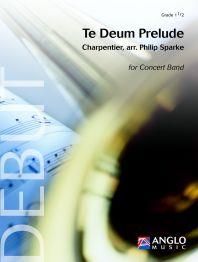 £68.99
£68.99Te Deum Prelude (Concert Band - Score and Parts) - Charpentier, Marc-Antoine - Sparke, Philip
Who does not know the famous Te Deum Prelude by Marc-Antoine Charpentier (1634-1704)? This French composer studied both painting and composition in Italy. Returning to France, he took up the post of music master to the dauphin. He collaborated with Molire, working for the Thatre Francais until 1685. He then returned to court and was music director to the Princesse de Guise, composition teacher to the Duke d'Orleans and wrote music for the dauphin's chapel. His Te Deum, of which the Prelude has become well known (particularly in Europe, where it is used as the Eurovision signature tune) is one of many pieces he wrote for important state and religious occasions.Duration: 2:30
Estimated delivery 7-14 working days
-
 £68.99
£68.99Te Deum Prelude - Marc-Antoine Charpentier
Who does not know the famous Te Deum Prelude by Marc-Antoine Charpentier (1634-1704)? This French composer studied both painting and composition in Italy. Returning to France, he took up the post of music master to the dauphin. He collaborated with Molire, working for the Thatre Francais until 1685. He then returned to court and was music director to the Princesse de Guise, composition teacher to the Duke d'Orleans and wrote music for the dauphin's chapel. His Te Deum, of which the Prelude has become well known (particularly in Europe, where it is used as the Eurovision signature tune) is one of many pieces he wrote for important state and religious occasions.
Estimated delivery 7-14 working days
-
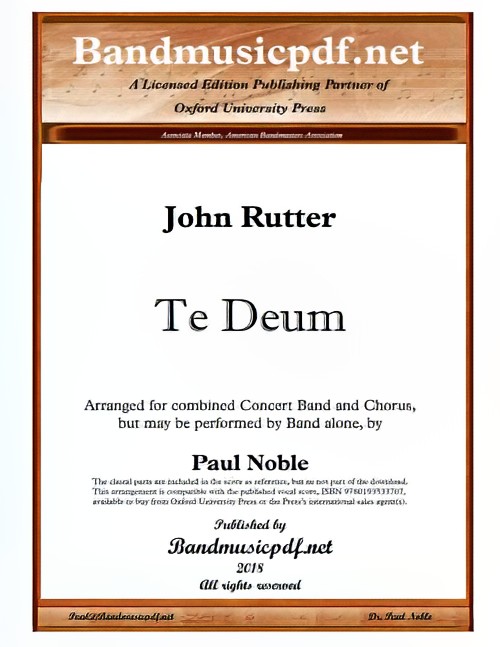 £120.00
£120.00Te Deum (Concert Band with Optional Choir - Score and Parts) - Rutter, John - Noble, Paul
Seven minutes of jubilation! John Rutter, one of the world's most revered composers, has given us a lively and jubilant setting of this inspiring text of thanksgiving. This arrangement for combined band and chorus may be performed by band alone. As with many of Rutter's pieces, the music alone says it all. It is extremely functional, straightforward, and accessible. Whenever a powerful piece of praise and thanksgiving is desired, Te Deum will make an outstanding choice. Don't miss this exciting arrangement from this outstanding composer!
Estimated delivery 7-14 working days
-
 £109.99
£109.99Te Deum - Jan de Haan
Groer Gott, wir loben dich is a well-known German hymn, written by Ignaz Franz in the 18th century but based on the 4th century Te Deum laudamus. After a radiant introduction by the brass section, the first variation on the chorale appears. Subsequently, the song is rendered in its original form. Then three more variations follow. The result is a solemn work that is very fitting within the context of a church service, but is also suitable for many other occasions.
Estimated delivery 7-14 working days
-
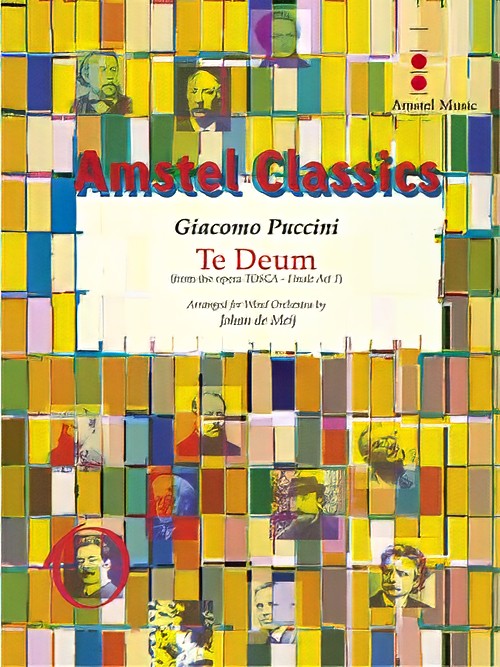 £94.00
£94.00Te Deum (from Tosca) (Concert Band with opt. Vocal Solo and Choir - Score and Parts) - Puccini, Giacomo - De Meij, Johan
Normally, a church is a place for silence, prayer and meditation. The contrary is true in Giacomo Puccini's opera Tosca, he turns the Roman basilica Sant' Andrea della Valle into a playground for hiding rebels, jealous lovers, sanctimonious fresco painters and invading police officers. Johan de Meij's exciting arrangement of the finale of the first Act from Tosca can be performed instrumental, or with a vocal soloist (Scarpia: Baritone) and choir (SATB). Duration: 5:15
Estimated delivery 7-14 working days
-
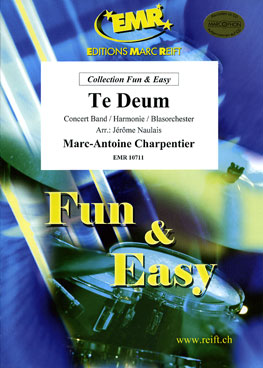 £76.00
£76.00TE DEUM (Easy Concert Band) - Charpentier, Marc-Antoine - Naulais, Jerome
Duration: 2:00
Estimated delivery 7-14 working days
-
 £94.00
£94.00 -
£59.80
Ave Maria Caccini / Te Deum Lully - Jean-Baptiste Lully
Estimated delivery 7-14 working days
-
 £76.00
£76.00Te Deum - Marc-Antoine Charpentier
Estimated delivery 7-14 working days
-
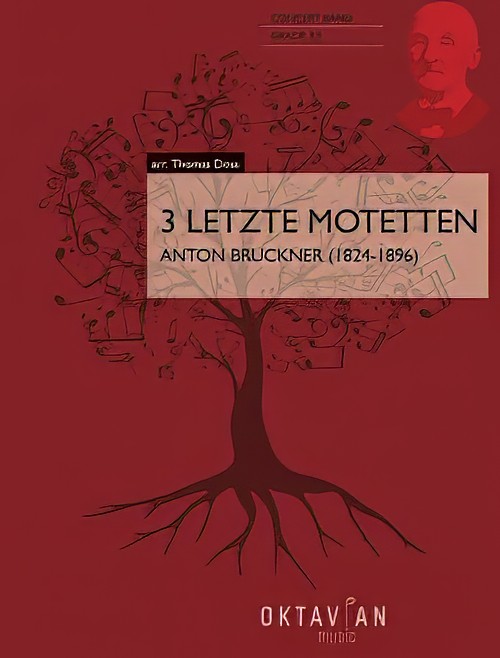 £123.20
£123.203 Letzte Motetten (Concert Band - Score and Parts) - Bruckner, Anton - Doss, Thomas
Anton Bruckner (b. 4.9.1824, Ansfelden, d. 11.10.1896, Vienna) didn't have it easy. Throughout his life, the Austrian composer was plagued by self-doubt. Anton Bruckner came from a simple, rural background. After the death of his father, he was accepted as a choirboy at the monastery of Sankt Florian in 1837. After several years as a school assistant and his own organ and piano studies, he first worked as organist in St. Florian, then from 1855 as cathedral organist in Linz. Introduced to music theory and instrumentation by Simon Sechter and Otto Kitzler, he discovered Richard Wagner as an artistic role model, whom he admired throughout his life and also visited several times in Bayreuth. In 1868 Anton Bruckner became professor of basso continuo, counterpoint and organ at the Vienna Conservatory; ten years later court organist; and in 1891 finally honorary doctor of the University of Vienna. He was considered an important organ virtuoso of his era, but had to wait a long time for recognition as a composer. It was not until Symphony No.7 in E major, composed between 1881 and 1883, with the famous Adagio written under the effects of Wagner's death, that he achieved the recognition he had hoped for, even if he was reluctant to accept it given his inclination towards scepticism and self-criticism. Anton Bruckner was a loner who did not want to follow a particular school or doctrine. He composed numerous sacred vocal works, such as his three masses, the Missa Solemnis in B flat minor (1854), the Te Deum (1881-84) and numerous motets. As a symphonic composer, he wrote a total of nine symphonies and many symphonic studies from 1863 onwards, tending to revise completed versions several times over. Bruckner's orchestral works were long considered unplayable, but in fact were merely exceptionally bold for the tonal language of their time, uniting traditions from Beethoven through Wagner to folk music, on the threshold between late Romanticism and Modernism. Anton Bruckner composed about 40 motets during his lifetime, the earliest a setting of Pange lingua around 1835, and the last, Vexilla regis, in 1892. Thomas Doss has compiled some of these motets in this volume for symphonic wind orchestra. These motets show many characteristics of personal expression, especially Bruckner's colourful harmony in the earlier works, which is in places aligned with Franz Schubert (changes between major and minor; and movements in thirds). Later works are characterised by many components which, in addition to the expanded stature of the movements, include above all a sense of the instrumentation as an outward phenomenon and the harmony as a compositional feature that works more internally. Some aspects of Bruckner's work are the result of his long period of study, which familiarised him not only with the tradition of his craft, but also gave him insights into the "modernity" of his time in such composers as Wagner, Liszt and Berlioz. From this developed his personal standpoint, which always pursues the connection between the old and the new.Duration: 14.00
Estimated delivery 7-14 working days
